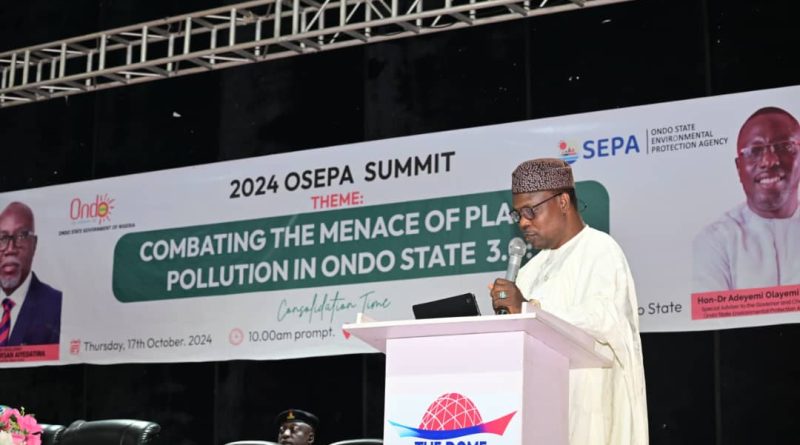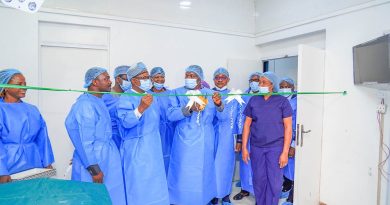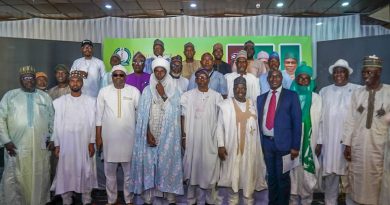Nigeria’s Roadmap On Circular Economy Will Create Resilient And Inclusive Regeneration, Waste Reduction- Minister
Minister of State for Environment, Dr. Iziaq Adekunle Salako, on Thursday, October 17, said his ministry, in partnership with other stakeholders, has launched a national circular economy roadmap with the vision to transform the economy to a circular, resilient and inclusive system that emphasizes value creation while reducing environmental impact and prioritizing regeneration, waste reduction and elimination by 2050. Salako who was speaking at the Ondo State Environmental Protection Agency Summit in Akure commended the Governor of Ondo State, Lucky Orimisan Aiyedatiwa, for combatting the menace of plastic pollution in Ondo State. He said Ondo State is aligning itself with the Federal Government’s vision of achieving a sustainable waste management future that combines economic development, natural resources conservation and environmental sustainability as well as the climate action and environmental advocacy pathway of President Bola Ahmed Tinubu.

“The President of the country, President Bola Ahmed Tinubu GCFR has demonstrated a strong commitment to environmental sustainability and climate action through his priority agendas, and strategic presence at global environmental events such as the 28th Conference of Parties the United Nations Framework Convention on Climate Change (COP28) held in Dubai, UAE. I am happy to note that His Excellency, Governor Lucky Aiyedatiwa is following on this climate action and environmental advocacy pathway of the President. My presence here today your Excellency is to demonstrate that the Federal Government particularly the Federal Ministry of Environment recognises you as an environment friendly governor and appreciates you for your climate actions.
“We live at a time where vast amounts of plastic waste generated is increasing at an unprecedented rate. Our changing consumption patterns, coupled with the rise of single-use plastics, packaging materials, and electronics is making the generation of plastic waste to grow exponentially creating a daunting challenge for our society. Dumpsites are overflowing, and plastic waste is ending up in the rivers and oceans; choking marine wildlife, damage the soil, poisoning ground water and resulting in serious adverse effects on human health”, he noted.
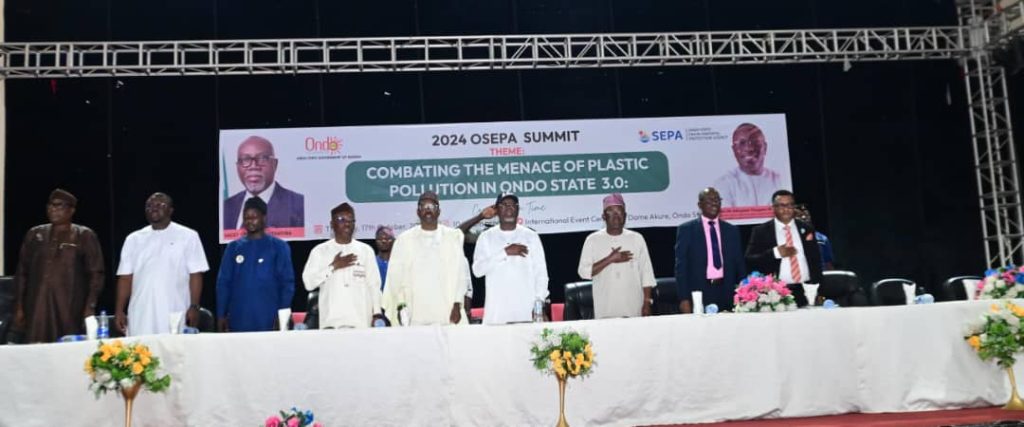
He said 15% of the solid waste generated in Nigeria translating to almost 5 million tonnes per annum is plastic. Less than 10% of this plastic waste is managed properly with the remaining over 90% littering our streets, blocking our drains, finding their way into the oceans and earning Nigeria the unenviable record of the tenth largest producer of unmanaged plastic in the world.
The Minster said circular economy concept is gaining traction globally as a model of production and consumption, which involves, reusing, repairing, refurbishing and recycling existing materials and products for as long as possible, extending the lifecycle of products and generating wealth along the value chain.
“This concept of circular economy presents an alternative to our current linear model of “take-make-waste” to a circular model where materials are repeatedly regenerated to maximise their value. I am happy to announce that the Federal Ministry of Environment in partnership with other stakeholders has launched a national circular economy roadmap with the vision to transform the economy to a circular, resilient and inclusive system that emphasizes value creation while reducing environmental impact and prioritizing regeneration, waste reduction and elimination by 2050. The waste sector is one of the identified priority sectors for the roadmap and plastic waste is probably the most challenging sub-sector.
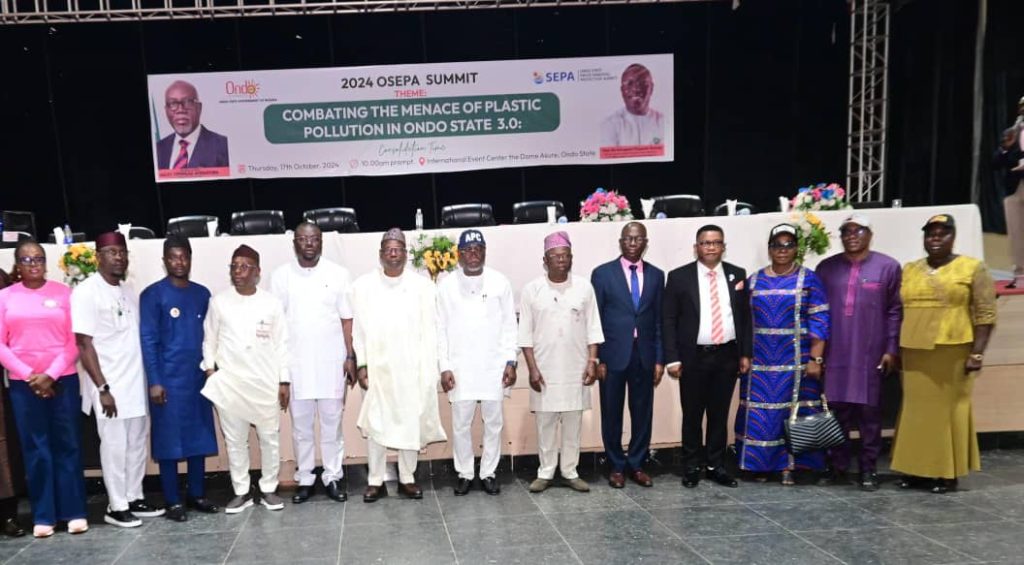
“The ministry is currently working on the implementation plan for the roadmap and it is expected that very soon a national system that our various sub-nationals can key into will be created to ensure a more robust and at scale management of our waste. The recent policy of the Federal Government to ban the use of single use plastics in its federal ministries, departments and agencies is a strategy to lead by example and promote minimization as a key component of the overall waste management strategy of the country. I want to encourage the Ondo State Government and other sub-nationals to adopt a similar policy.”
The Minister said the Federal Ministry of Environment is implementing many other policies and regulatory frameworks that support circular economy, such as:
● National Policy on Solid Waste Management;
● National Policy on Plastic Waste Management;
● National Policy on Waste Battery Management;
● Extended Producer Responsibility (EPR) initiatives, including alliances like the Food and Beverages Recycling Alliance (FBRA), E-Waste Producer Responsibility Organization of Nigeria (EPRON), and the Alliance for Responsible Battery Recycling (ARBR);
In addition, specialized programmes and projects that incorporate circular economy principles are also being developed. This includes
● Community based waste management programmes focused on waste separtion at source, recycling and composting.
● Waste to wealth entrepreneurship programmes to empower the most vulnerable groups especially youth and women, to boost recycling activities.
● Study on available sustainable alternative materials to plastics, innovative packaging and recycling technologies that meet market needs in Africa to reduce plastics leakages to the environment;
● Pro-Blue Project for which is being implemented in Lagos State with the aim of reducing marine plastic pollution and creating plastic recycling markets;
● Circular economy capacity building programmes for regulators at the Federal, State and Local Government levels and the private sector;
● Project on promoting sustainable plastic value chain through circular economy practices in the FCT and Lagos
● Project on circular economy approaches for the electronic sector in Nigeria aimed at collection and recycling of more than 300tons of e-waste in an environmentally sound manner.
He said Nigeria’s is participating in Global/Regional/National initiatives that promote circular economy, such as the Global Plastic Action Partnership (GPAP) and the Nigeria National Plastic Action Partnership (NPAP) to drive Nigeria’s plastic circular economy. Others are the African Circular Economy Alliance, where Nigeria is a founding member and co-chair of the African Circular Economy Alliance (ACEA) and the High Ambition Coalition to End Plastic Pollution.
“The private sector has a critical place in waste management. Businesses must adopt sustainable practices, reduce packaging, and create products that are easier to recycle. They must also take responsibility for the waste their operations generate and engage in partnerships that promote the circular economy. I will like to encourage industries and businesses to invest in recycling technologies and to promote environmental education among consumers so that together we can create a system that benefits not just businesses but the environment and society at large”, the Minister said.

